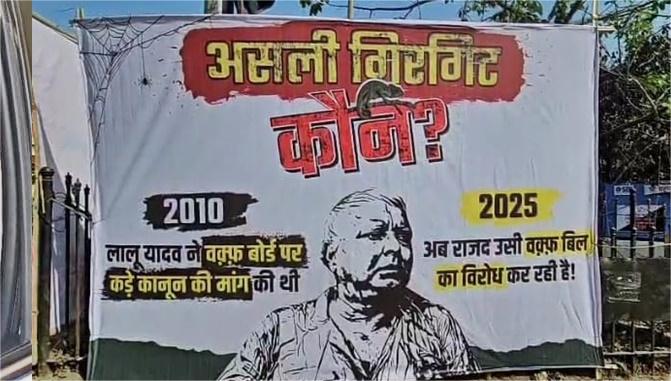Waqf Bill Sparks Poster War in Bihar: JD(U) Targets Lalu's ‘Doublespeak’, RJD Accuses Nitish of ‘Betrayal’

TCN News Desk
Patna: The political battle over the Waqf (Amendment) Bill has intensified in Bihar, with the ruling Janata Dal-United or JD(U) and Opposition Rashtriya Janata Dal (RJD) exchanging sharp barbs in a poster campaign ahead of the Assembly elections in the state.
A new poster appeared on the streets of Patna on April 5, questioning RJD leader Lalu Prasad Yadav’s alleged flip-flopping on the waqf issue. The poster referenced Yadav’s 2010 speech in the Lok Sabha, where he had demanded a stricter law to curb mismanagement of waqf properties. It contrasted this with his current opposition to the recently-passed Waqf Bill, asking, “Who is the real Girgit (chameleon)?”
The term “chameleon” was once used by Lalu's supporters to target Bihar Chief Minister Nitish Kumar, accusing him of shifting political allegiances. Now, the JD(U) has turned the tables, using the same term to highlight what they see as Lalu’s hypocritical stance on the waqf issue.
Reacting to the poster, BJP state president Dilip Jaiswal told IANS, “The public has now recognised how Lalu Yadav changes colours like a chameleon.”
He pointed out that in 2010, Lalu had criticised the Waqf Board for alleged mismanagement, accusing it of looting properties and calling for action against those exploiting waqf resources. Now, he said, Lalu was opposing the Waqf (Amendment) Bill, passed through a democratic process. “Isn’t that hypocrisy?” Jaiswal asked.
He took a sarcastic swipe at the Opposition, adding, “The Opposition was busy cleaning the mirror to find clean faces, but they did not realize — the dust was on their faces, not the mirror.”
Meanwhile, Bihar Health and Law Minister Mangal Pandey defended the Waqf Bill, asserting that it would bring justice to the poor Pasmanda (marginalised) Muslims and exposed the Opposition’s “hypocrisy”. He recalled Lalu Prasad Yadav’s 2010 speech in Parliament, in which he had accused the Waqf Board members of misusing lands, citing Patna’s Dakbungla Chauraha as an example.
“Lalu’s son (Tejashwi Yadav) should first hear his father’s words in Parliament,” Pandey said, highlighting the irony of Lalu’s current Opposition.
He further claimed that the Opposition’s objections were not about the bill itself but about losing control over waqf matters. “The poor are actually happy. This bill brings justice, especially for Pasmanda Muslims,” he said. “The chaos is being created by those who earlier misused the system. The NDA government has only done what Lalu Prasad once demanded.”
Supporting the bill, Bihar Governor Arif Mohammed Khan emphasised that waqf properties should serve public welfare, such as charity, orphanages and hospitals. “Allah’s property is for public welfare. How many waqf properties in Patna are running such services?” he questioned, underlining the need for greater transparency and fairness in managing waqf properties.
The poster war in Bihar is heating up as the state gears up for the 2025 Legislative Assembly elections. At least five Muslim leaders from the JD(U) have already resigned in protest over the passage of the Waqf Bill, further fuelling the political debate. The Opposition, particularly the RJD, has already fired back with posters attacking Chief Minister Nitish Kumar over his stance on the Waqf Bill and the National Register of Citizens (NRC).
One such provocative poster, displayed outside the residence of former CM Rabri Devi, depicts Nitish Kumar greeting a Muslim cleric, with the message: "Tum To Dhokhebaaz Ho, Wada Karke Bhul Jate Ho" — accusing the CM of being a "cheater" who fails to honour his promises.
This ongoing poster war is set against the backdrop of Bihar’s political landscape, where the JD(U) and the RJD are locked in a battle for dominance ahead of the crucial 2025 election.
